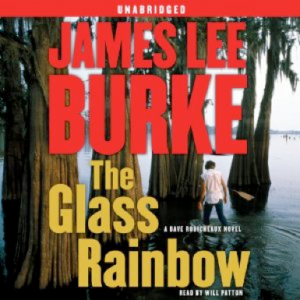
by jphilo | Sep 17, 2010 | Reviews

Very rarely, but just often enough to keep mystery buffs hoping, a book comes along that is almost perfect. For me, The Glass Rainbow by James Lee Burke was one of those books.
Here’s Booklist’s plot summary:
Dave Robicheaux is back in New Iberia, Louisiana, hoping to enjoy the company of his adopted daughter, Alafair, who is taking a semester off from law school to finish a novel. Not nearly as suspicious of Louisiana’s blood-stained aristocracy as Dave, Alafair has become involved, romantically and otherwise, with Kermit Abelard, a writer who is also the son of one of the region’s most notorious robber barons. Kermit, along with his friend, an ex-con turned best-selling memoirist, volunteers to help Alafair find a publisher for her book, much to Dave’s chagrin. Father-daughter conflict ensues, and as Dave’s investigation of a series of murders veers ever closer to the Abelards, it appears that, yet again, the closets of Louisiana’s rich are knee-deep in skeletons.
But Burke is too good a writer to rely upon the plot , excellent and twisting though it is, to make the book. Here’s what else he does:
- Burke respects his readers. He uses big words. He talks about books, classics, and assumes that writers are smart enough to know what he’s talking about.
- Burke’s descriptive writing is lovely. His descriptions of the Louisiana bayous include references that hint at Hurricane Katrina’s devastation. But, he makes readers want to help restore the countryside without preaching, politicizing or editorializing. And when he writes about the beauty of the land he knows, his love for the countryside shines through.
- Burke creates complex characters. In fact, they are probably the richest, with the most human flaws of any modern mystery writer. The good guys aren’t all that lovable, and he evokes sympathy for bad guys. The main protagonist, Dave Robicheaux, and his best friend, Clete Purcell, are most notable. In this book, they struggle with advancing age and mortality.
- Burke leaves things out. Though his novels are bloody and dark, when things get really bad, he doesn’t go into details. Instead, he tells us what the characters think of what they saw. Their disgust and revulsion is enough.
- Burke believes in good and evil and he clearly delineates between the two. But like real people, his characters struggle with choosing good over evil.
- Will Patton’s audio performance. Somehow, this man conveys the slow, easy pace of southern life with each syllable. How can one man’s voice summon an audio picture of a culture? (Note: If you listen to the audio, be sure it’s the unabridged version. What a crime to miss any of his spectacular writing.)
I’ve read a few of the Dave Robicheaux novels, but it’s time to read them all. If the others are half as good as The Glass Rainbow, they will be a feast.
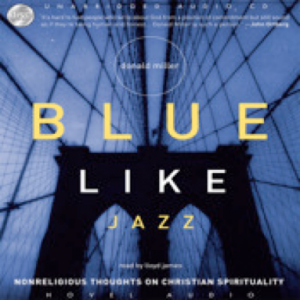
by jphilo | Sep 10, 2010 | Reviews

Last night I finished Donald Miller’s Blue Like Jazz. Some of you may be rolling your eyes and thinking, “She is so not in the new decade.” Well, you should know I’ve been meaning to read the book for years, ever since it debuted as the scuzzy new kid on the Christian memoir block in 2003. Finally, after hearing Miller speak at the Mothers of Preschoolers (MOPS) International Convention this past August, I made it a priority.
The book was funny, sad, challenging, simple, irreverent, reverent, doctrinally sound, doctrinally unsound, puzzling yet startlingly clear. Which means I really, really liked it. Mostly because Miller asks the questions “proper Christians” are afraid to ask. He also admits to temptations, sins, and thoughts common to veryone, though most of us lie about our humanness.
Blue Like Jazz made me laugh. It also enhanced my reputation with the younger generation at our Labor Day Family Reunion. My cousin’s son saw it lying on the couch and asked who was reading it. When I owned up, the look in his eyes said my standing on his cool-hip-jive meter rose a few notches.
In one of the last chapters of the book, Miller described his hippie summer. He wasn’t a bonafide hippie, but he hung around with then and discovered he liked them. Why? Because they accepted him as he was. They didn’t judge him like the Christian community did. For years, he struggled to reconcile their questionable moral behavior and the acceptance he felt in their presence. I won’t tell you the details about how he overcame the struggle. Otherwise, you might not read the book.
This morning, I interviewed a woman who runs a disability ministry in a very large church. When asked what drew her to the ministry she said, “I like it because the people I work with accept me for who I am. They don’t care what I wear, what kind of car I drive, what job I have. They just love me. I’m not doing this out of pity or condescendingly. They give me so much.”
On many levels, her words echoed the conclusion Miller drew, the one I’m not telling you about so you’ll read the book. But I’ll tell you this much. His conclusion involved the true definition of love. As she spoke, I sensed God speaking to me about what love is and how far I fall short of demonstrating true love to others. Thanks to Blue Like Jazz and the wise woman on the phone, I know more about love today than I did yesterday. But I have a long way to go before I know how to love like that.
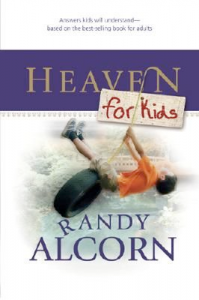
by jphilo | Sep 6, 2010 | Reviews

Lately, my reading has been focused on research for my work in progress, Different Dream Parenting: Raising a Child with Special Needs. As part of that research, I’ve been searching for resources that help prepare terminally ill children for death, and so far, nothing has surfaced.
The only book that comes close is Heaven for Kids by Randy Alcorn. It’s written for kids in general, since all kids ask questions about death and heaven, as every parent knows. In it, Alcorn does a good job of taking the information from Heaven, his book for adults, and adapting it to kids’ perspectives, seeing what they see and thinking like they do.
Since all the answers in both Heaven and Heaven for Kids are biblically based, this was a difficult feat. To accomplish it, Alcorn leaned heavily on The Chronicles of Narnia, the classic children’s series by C. S. Lewis and the movies based on them.
Alcorn groups the questions into the following chapters:I
- ntroduction: Why Whould We Look Forward to Heaven?
- Chapter One: What Can We Know about Heaven?
- Chapter Two: After We Die, Then What?
- Chapter Three: How Will We Relate to God in Heaven?
- Chapter Four: What Is the New Earth? What Will It Be Like?
- Chapter Five: Who Rules?
- Chapter Seven: Who Will We Hang Out with in Heaven?
- Chapter Eight: Will Animals Live in the New Earth?
- Chapter Nine: What Will We Do in Heaven?
- Chapter Ten: How Can We Know We’re Going to Heaven?
- Conclusion: The Story That Goes on Forever
Within those groupings, the author answers questions like these:
- Can people in heaven see what’s happening on earth?
- Will we really see God?
- Will we wear clothes?
- Will we sleep?
- Will people get married?
- Will we see our pets again?
- Will we travel through time?
This book is a great resource for parents of healthy kids and a blessing to those facing the death of any family member. To get the most from the book, I recommend first reading the Chronicles of Narnia series with kids and then reading Heaven for Kids together. Otherwise, the frequent references to Narnia will make little sense.
That said, I could sure use more kid-friendly resources for families grappling with the death of someone they love, especially children. So if anyone knows of any, please leave a comment. Thanks!
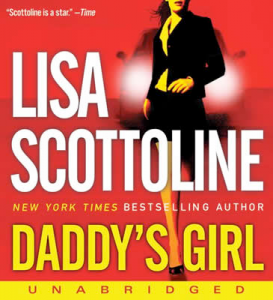
by jphilo | Aug 26, 2010 | Reviews

When you pick up a Lisa Scottoline novel, what comes to mind?
Legal thriller? Yes.
Women lawyers? Of course.
Philadelphia? No doubt.
Road trip? Maybe not so much.
But on a recent, unexpected road trip, and a long one at that, I found the audio version of Daddy’s Girl by Scottoline to be a perfect traveling companion. Performed by the incomparable Barbara Rosenblat (this woman can make every voice, from a young child to a elderly socialite to a male prison inmate to a poverty-stricken Appalachian migrant sound believable), the book kept me wide awake for hours.
Now, I’m not saying Daddy’s Girl is classic literature. It follows the standard thriller formula, starting with a hero minding her own business who is suddenly thrust into an impossible situation as all her normal supports – social standing, friends, money, cell phone, car – are knocked away one by one. Eventually, armed with only her wits, she wins the day and proves her mettle to herself and those around her. The book screams “women can do everything men can do” with as much subtlety as punk rock hair cut.
However, Daddy’s Girl did its job well, keeping me awake on a long drive. More than that, the author made me care about the protagonist, Nat Greco. I wanted to see how she solved her dilemma, which she accomplished with the requisite number of wasted cars, hidden guns and funky disguises. The book even had an unexpected twist near the end, a small wrench in the romance end of things, to keep things interesting.
Daddy’s Girl may never make it into my top ten favorite books of all time. But Lisa Scottoline won’t care, because she accomplished what successful authors must do. She made herself indispensable in my little world.
Before my next road trip, I’ll find another Lisa Scottoline audio book to keep me company. And that’s exactly what Lisa was hoping for all along.
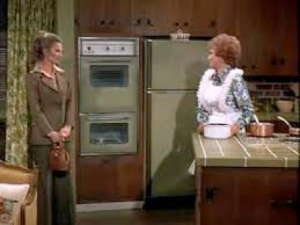
by jphilo | Aug 19, 2010 | Reviews

Some time back, I reviewed the DVD of the third season of the Mary Tyler Moore Show. Well, my daughter and her fiance (now husband) got hooked on them, so in the weeks before the wedding we watched our way through seasons one and two also. We even started season four, but then wedding week arrived. But, the show we did watch, The Lars Affair, shows off two of the all time best female comedians giving two of their best performances ever: Cloris Leachman and Betty White.
Cloris Leachman, as Mary’s progressive and ostentatious landlord Phyllis Lindstrom, was a regular cast member since the show’s inception. But this show marked Betty White’s first appearance as Sue Ann Niven, the man hungry star of WJM-TV’s happy home show.
In this episode, Phyllis learns that her husband Lars is playing around with Sue Ann and fights to win him back. Graced with a script so well written not one word is wasted, Leachman and White play their parts to perfection. Every word, every gesture, every facial expression add to their characters and the interplay between them. Leachman’s performance won her an Emmy and White’s resulted in her becoming a regular on the show. ( You can hear Mary Tyler Moore talk about how White became part of the show at www.emmytvlegends.org.)
Because I was rather distracted by wedding details during my first viewing of The Lars Affair, I forced myself to watch it again this week – purely in the interest of research. Surely, I thought, it couldn’t be as funny as I remembered. But it was. And it is.
So if you need a laugh, and don’t have time to watch every episode, watch The Lars Affair. It’s classic TV. It’s worth watching. It’s a gift from Betty and Cloris.
Thanks to both of them.
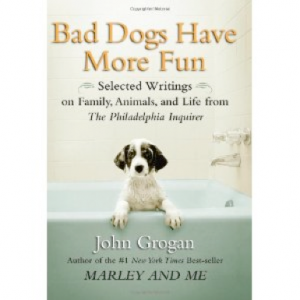
by jphilo | Aug 13, 2010 | Reviews

As a fan of John Grogan, author of Marley and Me, I was pleased to find the audio version of Bad Dogs Have More Fun, a collection of his columns from the Philadelphia Inquirer. After listening to it, I was eager to give it a good review.
But while doing research for the book review, I discovered some disturbing news. John Grogan, the author of the book, didn’t have any say in the publication. Here’s what he says on his blog at www.johngroganbooks.com:
…it was published by the newspaper and Vanguard Press without my consent or involvement — not even my prior knowledge. I only found about this collection through a third party after the Inquirer and Vanguard (with whom I have no association) had already signed the contract.
Grogan goes on to say he receives no compensation or royalties from the book, even though they are his work. To make sure he wasn’t in the midst of an angry vendetta with his former employer, I checked out the newspaper’s website for the book, www.baddogsbook.com. Here’s what it says:
The articles in this book were originally written by John Grogan and published as a weekly column in The Philadelphia Inquirer, which owns the rights to them. This book is being published through an arrangement with The Philadelphia Inquirer. Mr. Grogan has not participated in its publication and is not profiting from it.
Now the newspaper tries to spruce up their actions by saying “a percentage of the profits from the sale of this book will go to The Good Dogs Foundation.” But their whitewash doesn’t cover the injustice done to Grogan. He explained it further on his blog:
The Philadelphia Inquirer owns the copyright to the work I produced during my four years as a staff columnist there. I was what is known as “a writer for hire.” This is the customary work arrangement at newspapers, but the decision to collect a columnist’s works in book form (Anna Quindlen, Dave Barry, Lewis Grizzard, etc.) is typically initiated by the writer and becomes a cooperative endeavor between the writer and the newspaper.
As an author, I’m on John Grogan’s side and will honor his request not to purchase the book. Instead, I’ll get my Grogan fix by reading his blog and purchasing his new book, The Longest Trip Home, along with his series of Marley children’s books. There’s plenty of John Grogan to go around. No need to steal from the guy who freely shared the story of his crazy dog by reading a book he had no say in.
Bad dogs may have more fun, but in my opinion, bad newspapers deals should not.







